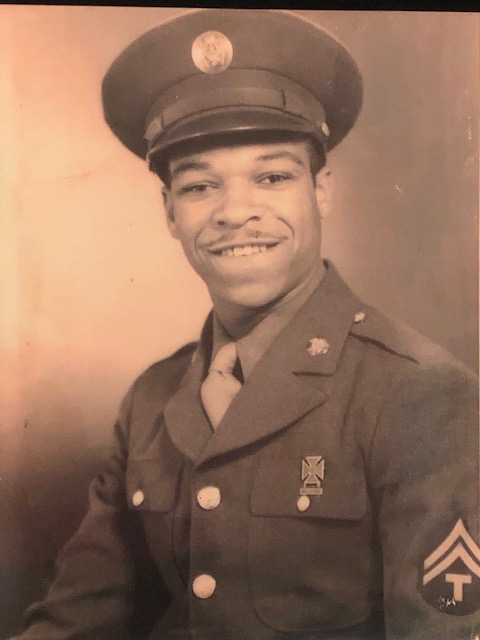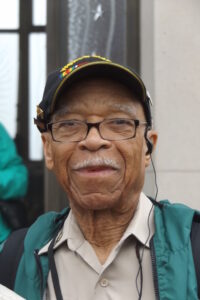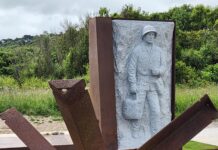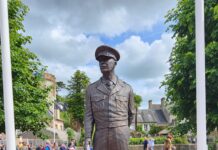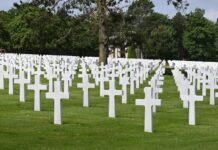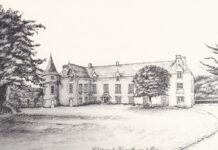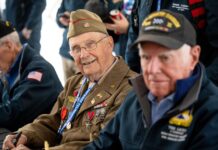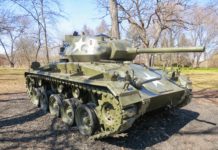Benjamin Berry, now 100 and living in Germantown, Pennsylvania, was a gung-ho teenager when he entered the U.S. Army during World War II, serving from 1943 to 1945.
According to a 2024 article in the Chestnut Hill Local, written by Kristin Holmes, Berry grew up in the Crestmont section of Willow Grove. He graduated from Abington High School in June of 1943. After entering the Army in July 1943, he was in basic training at Fort Frances E. Warren in Wyoming.
The U.S. military was segregated during World War II, with black soldiers serving in units usually commanded by white officers. In an interview with Margaret Heeson in 2023, Berry said he was assigned to a segregated quartermaster unit that transported supplies and operated facilities for soldiers to shower when they came out of battle. Berry, a member of the 863rd Quartermaster Fumigation and Bath Company, also drove a truck that transported supplies.
He soon learned the inequity of being a black soldier during the war as the Army gave him a rifle, but didn’t provide ammunition. That changed when his unit, which followed the infantry, was sent to the Battle of the Bulge. He and other black soldiers were finally given ammunition to help fight off the Nazi counterattack in the Ardennes Forest.
Berry, who left the service with the rank of corporal, landed in France after D-Day. He served in the Normandy Campaign, Huertgen Forest and the Battle of the Bulge, among other battles. He was with the unit when it helped to liberate Pilsen in the Czech Republic.
After the war, Berry went to school on the GI Bill. He married Lois Miller Graves and raised four children in Pennsylvania.
He recently received a citation and medal from the Grand Duke of Luxembourg to commemorate his war service. He also was named to the U.S. Army Quartermaster Hall of Fame. In addition, in March 2024, he was honored with the French Legion of Honor for his service in Europe during World War II.
Interviewer: Why did you join the U.S. Army?
Berry: “I had no choice, I was drafted. Uncle Sam said, ‘I need you,’ so you went. In fact, in some cases, the military came after you and put you in jail if you did not go when called. Only reason you did not go is if you had a medical excuse. We did not try to make up a fake excuse not to go because you’d be considered a F4, a reject, a wimp by friends/peers. We didn’t try to pull any strings either to get us off the hook so we didn’t have to go. The army designated the men in different classes: Classes A, B, C and D. If you were considered one of these, then you’re able to go.
“Uncle Sam, and even the girls in the community, did not want anyone who was a Class F4. Other soldiers, those who were accepted, called you a ‘Jodie’ if you weren’t physical able to go into the war. Even having flat feet did not keep you out of WW2 because at least you could peel potatoes.”
Interviewer: Did anyone else in your family serve during the war?
Berry: “My brother “June” (James) was drafted into the Army, but I don’t recall which area. I think the Pacific somewhere. But I ran into him one day at a recreational area in France. There were many other military outfits there too and I just happened to see June. I sure was excited and happy to see him. ‘Hey what are you doing here?’ was our first comment to each other. We hung out an hour or so, which was great. Don’t know anything about him, or what unit he served—or even what we did while we were there socializing.”
Interviewer: What did you learn during training?
Berry: “To follow orders and not to be last. That includes for reveille call in the morning before breakfast. During the war, one of my jobs was to escort soldiers to the infirmary. Make sure we did what our job description was to a ‘T,’ even finding water in a stream and get it for the troops if need be. No ifs, ands, or buts. No excuses!”
Interviewer: How did the Army making basic training tough?
Berry: “We were instructed to crawl on the ground, as close as you could to the ground, because the overhead ‘enemy’ was shooting with blanks and some live ammo. So you were warned not to stand up or even rise up, but crawl and let the enemy shoot over you. If you stood, you might be hit by an actual live round. One guy from my hometown did actually rise up by accident and was hit by live ammo and killed. He never did make it out of boot camp to ‘see action.’ I did not know him nor knew about the incident until days after it happened.”
Interviewer: What was the Army like during wartime?
Berry: “At that time it was integrated, all blacks, at least in my quartermaster unit. But the officers were all white. My unit was in charge of service and supplies, transportation, food, clothing, laundry and providing recreation for the GIs and also to remove the injured from the front lines.”
Interviewer: What were the most difficult things you dealt with in World War II?
Berry: “Several difficult experiences come to mind right away. One is trying to dig a foxhole in the cold frozen ground under the cover of the Huertgen Forest in Germany and during the Battle of the Bugle. Foxholes and trenches were dug with a standard military folding ‘survival shovel.’ It was very small because it could be carried easily in our backpack. We had to dig fast and dig deep to hide and be camouflaged from the enemy. Dig through frozen ground and frozen tree roots. In most cases, there was overhead fighting, but not direct fire. Digging foxholes was to prepare us for the approaching enemy. “It was also difficult to think about home—about you being without mom and dad, family and friends. But the idea was to have the enemy either surrender or be dead so the war would end so you could be home. That was your incentive to continue to move forward so you could get back home. To kill or be killed. Hurry up and let’s get this war over with so I can go home!”
Interviewer: How was the weather in the winter of 1944-1945?
Berry: “The climate was difficult on my body because of the low temperature every day—the snow, the frozen ground. It was very, very difficult trying to get the blood circulating in your fingers. Gloves did not do any good. The temps were brutal. It’s funny because when I was a younger back home, below freezing temperatures were nothing to us. We’d be out all day sledding. We didn’t mind the cold, but being in war, it’s completely different.”
Interviewer: How did you prepare for the cold?
Berry: “A vivid memory is that the Germans had white uniforms and equipment. They were prepared for the snow. They had white camouflage uniforms. Their vehicles, tanks, trucks, etc. were painted all white to blend in with the snowy terrain. The Americans were not prepared for that region though because we had olive-drab green uniforms, trucks and equipment. We had to get orders back to headquarters fast and order white paint to repaint our vehicles from olive drab green, which stood out like a sore thumb so we could have a fighting chance.
“Even though the British and Americans did not have white camouflage uniforms and equipment, we were still ordered to stop the enemy at all cost. Even in spite of our olive green uniforms and equipment that stood out like a fly in a glass of milk. We wanted to wait for the white paint but we still had to fight with our green equipment. We can’t tell the enemy, ‘hey, stop the war for a while so we can paint our equipment.’ Somehow, we had to get it done while still fighting on the front lines in the frigid temperatures.
“We never got our white uniforms. I’m not sure if the white soldiers got the proper color uniforms before the blacks, but I suspect they did.”
Interviewer: What kind of weapons did you use during the war?
Berry: “We had the smallest carbine rifle that Uncle Sam had, and we used it for target practice during training. We kept rifles but us blacks had to give back our ammunition. All during the war, we had no ammunition, until we had to fight in the Battle of the Bulge. But even so, we still had to keep our rifles clean and inspected. The purpose was probably due to a racial thing. Only a few us of had some ammo but only two or three bullets. I was one who had it.
“We’d do target practice in the garbage dump piles. Rats were a good target. When we’d leave an area, we’d dump refuse in a hole that we dug and cover it up. We also dug big trenches for our outhouse.”
Interviewer: Did you have any interaction with the local people?
Berry: “The civilians would hear about us leaving an area and how we’d leave surplus supplies like soap, food scraps, etc. and they’d come soon after we’d leave an area and dig up things to use for their own families. When our GIs heard about the women washing in the streams and needing soap and fighting over our soap scraps, the GIs purposely let soap bars float downstream for the women to get, and not bury the leftover soap along with the garbage and other debris.”
Interviewer: Did you see Holocaust survivors?
Berry: “A vivid memory were the Jewish Holocaust victims, who were rescued by the Allies and brought into our camps, and how humanity could do those horrific deeds to other humans…just for greed. Even to this day, there are some flashbacks that remind me of those photographic memories and physical [strain] I went through.”
Interviewer: Did the war change you?
Berry: “It pretty much made me realize that you’re not alone. You do have buddies, friends and enemies. What I realize now is that all men are created equal but are not treated equal. Someone always wants to be on top and have someone else underneath of them. Nobody wants to be on the bottom. And you should not be [on the bottom], so try to reach always upward…higher. In this day and age, with technology, you can make it. It reinforced what I felt about humanity all along even before going into the war.”
Interviewer: What was your most rewarding experience in World War II?
Berry: “That I survived! It taught me to kill or be killed. Naturally, you want to shoot the first shot…and don’t miss!”
Interviewer: Did you have a diary or take photos to record your service?
Berry: “I did have one camera and took photos in Luxemburg. Took my camera to a civilian photographer to be developed, but I got shipped out before I could get my photos back. I was very disappointed because one photo was of the ‘Tiger Tooth’ aka Siegfried Line. It was zigzag with spikes of iron from France—and throughout Belgium and other areas. It was an area that Hitler set up to keep the Allies out.”
Interviewer: What was an event you remember when you returned home?
Berry: “A prisoner of war was from the Crestmont section of Willow Grove, Pennsylvania, my hometown, who returned. I don’t know which Japanese island he was on though. After the war, he was released and came home and was honored by our hometown by being in a parade. He rode on a fire truck as a hero, which wasn’t done for blacks at that time. His last name was Upshore, but I don’t recall the first name. He was younger than I. I knew his brother Jimmy and sister Hazel.”
Interviewer: What do you want younger people to know about World War II?
Berry: “The younger folks should look at WWII not as a history book back in 1944 and 1945, but also as a history lesson that lives. Human beings were not lost, but were taken due to greed of other countries who wanted to succeed in ruling the world.
“This world was created for all. We started out as one human race and split off to various races throughout the world. Today, let’s enjoy what freedoms we have and love your fellow man, putting God first: the love of God.
“Since all men were created equal, it’s only greed and being superior that’s gotten this world in the condition that we’re in today.”



